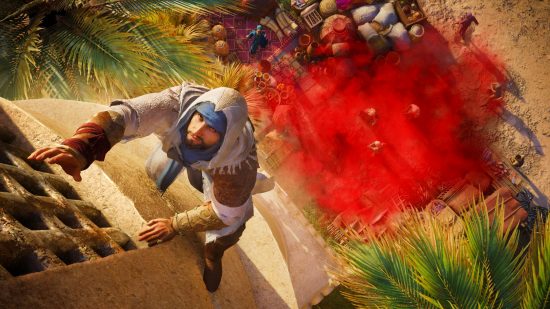Assassin’s Creed Mirage, the Ubisoft stealth game spin-off from Assassin’s Creed Valhalla, set to launch just ahead of Codename Red and Assassin’s Creed Infinity, will feature some deep references to both Arabic and Muslim mythology.
Focusing on Basim, Eivor’s companion from AC Valhalla, Assassin’s Creed Mirage takes place in 9th century Baghdad, and is slated to focus more on stealth gameplay and a self-contained story than some of its bigger, RPG-style counterparts. It will launch ahead of Codename Red, set in Japan, and the mysterious Codename: Hexe, rumoured to centre around witch trials and 16th century Europe, both of which will form part of the new Ubisoft hub service Assassin’s Creed Infinity. The early trailers for Mirage reveal a shadowy, otherworldly figure that seems to haunt Basim as he journeys from apprentice to master assassin. Now, Sarah Beaulieu, narrative director on AC Mirage, confirms this enigmatic entity will be based on key elements from Arabic and Muslim myth.

“The creature Basim sees in the Assassin’s Creed Mirage trailer is indeed a djinn,” Beaulieu writes on Twitter. “We call it ‘jinni’; we use the Arabic word. I’ve seen your theories about him. Tons of great ideas, but none of them close to the truth. Don’t worry, you’ll get to meet our jinni soon enough.”
Djinn occupy a varied and ambiguous position both in Arabic folklore and Islam. Ostensibly spirits, they differ from conventional ghosts as they are not dead people returned to life, but rather entities that have existed on the earth since its creation. In some cases, djinn can be well-meaning, good, and follow the practices of Islam. In other cases, they can be malevolent and unbelieving, similar to demons, but still subject to the word of God. Though they form part of the broader Islamic theology, they also predate the religion’s foundations in 7th century Saudi Arabia, and have long-existed as part of Arabic and Middle-Eastern mythology.
Assassin’s Creed fans are speculating on the nature of the Mirage djinn, saying it could be an embodiment of the spirit Loki that Eivor witnesses in Valhalla. “My theory is the djinn is Loki seen through Basim’s cultural myths,” writes on AC fan. “Eivor saw Loki through her Norse filter because of her beliefs and where she was from.” “My theory is that what Basim is seeing is a data corruption of Loki’s resurrection protocol,” says another. “Since it looks absolutely terrifying, Basim attributes it as a djinn.” Whether these are the theories that Beaulieu describes as “not even close” is unclear, however, and the nature of the djinn in Assassin’s Creed Mirage could be something entirely separate.
As we head towards the next phase of Assassin’s Creed, it’s time to get the most out of Valhalla with our tips and tricks guide. You might also want to find all the tomb locations in Assassin’s Creed Odyssey, or maybe sample something else entirely from our list of the best RPGs on PC.
